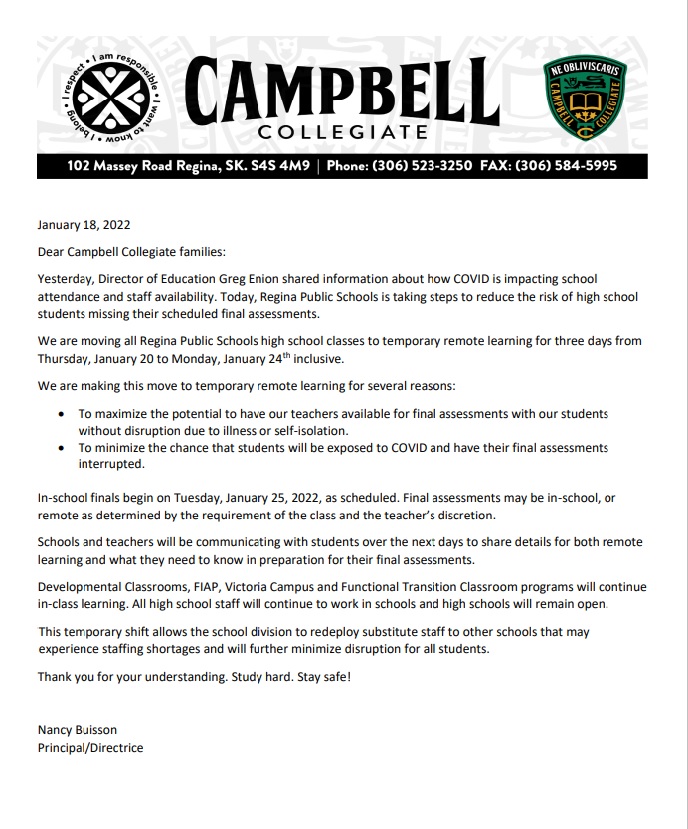Rising COVID-19 cases in Saskatchewan have prompted school divisions to change course in order to limit the spread of the virus.

Regina Public Schools announced its high schools will be switching to temporary remote learning ahead of final exams.
Online learning will take place from Thursday to Monday.
The school division said the decision is based on maximizing the potential to have teachers available during final assessments with students without disruptions from illness or self-isolation requirements. Regina Public added the move will minimize the chance students contract COVID-19 and have their exams interrupted.
“This temporary shift allows the school division to redeploy substitute staff to other schools that may experience staffing shortages and will further minimize disruption for all students,” wrote Campbell Collegiate principal Nancy Buisson in a letter sent to school families on Tuesday.
The plan is to continue in-person finals next Tuesday as scheduled. However, teachers may determine whether exams can be completed in-school or through remote learning.
There were 526 self-reported COVID-19 cases in Regina Public schools last week, according to a letter distributed Monday by the division. In that same time frame, 53 cases were amongst school staff.
“To date, school operations have been strained as teaching, administrative and facilities staff have had to cover for absent colleagues,” it states.

Get weekly health news
As for the Regina Catholic School Division (RCSD), students who are unable to attend due to COVID-19 reasons will have their final grade assigned to them based on course work.
The division said students do not need to make up their final if they are absent and no penalty will be handed to students who are unable to make it to their exams.
“Final assessments are academic risk-free assessments for students; your mark cannot go down if you take the CFD,” said RCSD.
Noah Lubas, a Grade 10 student at Miller Comprehensive Catholic High School, said he would likely write them,“ just because we don’t know how much longer they’re going to be this way, right?”
Fellow student Dylan Goldsney said students felt less stressed knowing exams would be optional.
A couple of schools in Saskatoon Public Schools recently moved to remote learning.
The 1,300-odd students at Centennial Collegiate, a public high school, started online classes Tuesday. The division hopes to resume in-class learning beginning Monday.
The division shared in a release that extra-curricular activities are also paused until classes are back to in-person.
John Dolan School is the other school moving to online learning. Students and staff began the switch Tuesday and will continue on Wednesday since there are not enough nursing staff at the school who help with specialized education programs for students with multiple disabilities.
‘Completely overwhelmed’
Saskatchewan Teachers’ Federation president Patrick Maze said on Tuesday teachers across the province are frustrated and overwhelmed by the COVID-19 situation in schools.
“They don’t feel prepared. It’s hard to plan from day to day because every day brings new situations and situations of having half of their class show up,” explained Maze.
“It’s kind of a system that’s completely in disarray right now and we’re trying to get through.”
Maze added that the situation has become confusing for staff in schools due to different messaging and measures as the province adapts to rising cases of the virus.
He said there are some frustrations towards the government’s handling of the pandemic from an education point of view.
“It would be nice to have leadership from the provincial level giving school divisions more explicit direction rather than just having them forced into making up their their rules as they go along,” Maze suggested.
“Trying to make preparations on the fly is never really effective when we’re dealing with students and dealing with students’ education, and it seems like government is content with doing that.”
Maze continued by saying the federation and its members prefer in-person learning, but he said remote learning is in the best interest of students to reduce COVID-19 transmission in schools.
During a provincial COVID-19 briefing on Tuesday, education ministry programs branch director Kevin Gabel said the school divisions, working with local medical health officers, decide how to react to COVID cases.
“We leave it up to them and the medical health officials to make the best decisions possible,” he said.
“We believe the measures that are currently in place will support the continuation of in-class learning but we are aware there will be disruptions,” he later added.
Gabel said the government believes it’s important to resume in-class learning “as normally and as safely as possible.”
Maze agrees. But he said teachers don’t feel safe.
“It seems like… Omicron is so transmissible that (the) government just seems to have given up and said, ‘go ahead and mix and eventually you’re going to get it,’” he told Global News.
The province’s chief medical health officer Dr. Saqib Shahab said around a quarter of community transmission of the Delta variant occurred in schools and that he expects the Omicron variant to spread the same way.
“We know that our members prefer in-person learning. It’s what’s in the best interest of students, but it has to be done safely,” Maze said.











Comments
Want to discuss? Please read our Commenting Policy first.